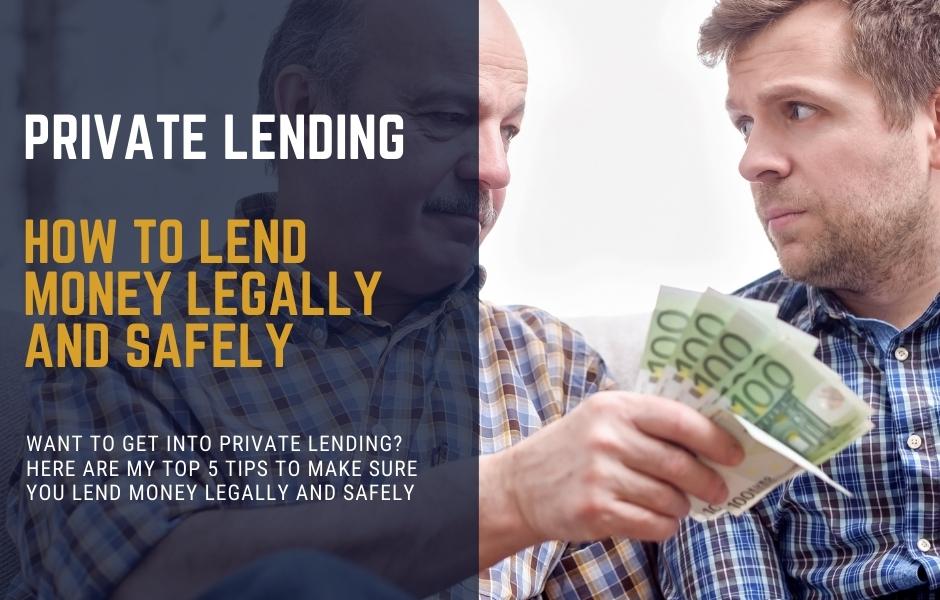Private Money Lending | How to Lend Legally and Safely in 2023
Investor Bonus: See Investor-Ready Private Lending Deals Every Thursday
Private lending is a popular way for investors to earn passive income at a better rate of interest, but there are some legalities to be aware of, and plenty of ways to lose money, too. Here's my top 5 tips for lending money legally and safely in 2023 and beyond...

David Garner
How to Lend Money Legally and Safely
In a World increasingly defined by economic uncertainty, private lending is growing in popularity as a way for individual investors to diversify their portfolios outside of the stock market, and find a safe, productive home for their capital.
At face value, the appeal of private money lending seems obvious…
… providing short-term, asset-backed loans to real estate investors allows private individuals to ‘become the bank‘, earning a great rate of interest while physical and insured real estate is held as security.
Simple, right? Well, yes. But of course, there’s more to it than that!
As with anything nowadays, there are an increasing number of legalities and regulations you should be aware of when lending private money. And, if you want to lend your money as safely as possible, there are definitely a few more things you should know before you get started.
In this article, I’m going to walk you through some of the most important lessons I’ve learned taking part in over 100 private lending transactions as both lender and borrower in the past 10 years, and give you my top tips for lending money legally and safely in 2022.
1. Know the Rules
Broadly speaking, there are no restrictions on who can become a lender. But there are definitely some restrictions on the type of loans you can originate, to whom you can lend, and on what terms.
Beware Consumer Loans
One of the key things to be aware of as a private lender is the difference between consumer lending and commercial lending. You definitely don’t want to stray into the heavily-regulated world of consumer finance, trust me!
Here’s the difference between the two, and why it’s important to know…
For the most part, a consumer loan is a loan that’s issued to a consumer; or, in laymans terms, an individual person. This includes mortgage loans for the purposes of purchasing a primary residence.
When talking specifically about mortgages (which we are) a commercial loan is usually used for the purposes of purchasing (or refinancing) real estate that is NOT the borrower’s primary residence.
More often than not, the borrower on a commercial loan will be a corporate entity such as an LLC.

This distinction is important because…
After the 2008 recession, the US Government signed the Dodd-Frank Wall Street Reform Act. The idea behind this legislation was to safeguard consumers and taxpayers from the big risks taken by investment banks.
As a result, lenders now have to do a lot more work to prove that borrowers understand the risks involved when taking out a loan, and that the loan terms are appropriate and affordable.
This includes much higher standards when when it comes to things like verifying credit history, income and employment status. And… there are also nationwide licencing requirements for originating residential mortgage loans.
So, if you are going to be doing any private lending, you need to be sure that you are not originating a consumer mortgage loan.
Instead, simply stick to lending your money to real estate investors for the purposes of purchasing, renovating or refinancing an investment property.
Sticking to this simple rule will ensure you won’t trip up and inadvertently break the law!
Usury Laws
Usury laws are designed to protect borrowers from predatory lenders. These regulations cap the amount of interest a lender can charge a borrower.
This is especially important in the world of private lending where interest rates are usually much higher than consumer loans.
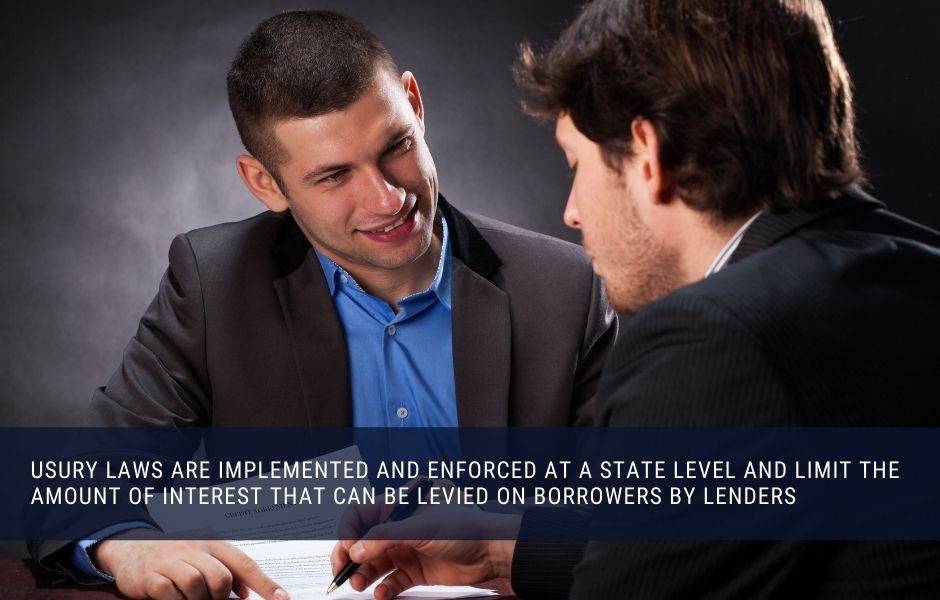
If you set your interest rate or total amount of interest too high, you might end up on the wrong end of a lawsuit, or worse, find yourself with an unenforceable loan.
Each state has it’s own state-specific usury laws, and the laws that apply to any mortgage loan you originate will depend on the state the real estate is located in, note where the loan originator or lender is based as well.
Pro Tip: Make sure you’re aware of the Usury laws in the State you’re lending in.
State Lending and Licensing Laws
Alongside usury laws, each state has it’s own regulations on lending in general.
In some states, such as California and Oregon for example, it is illegal to originate a mortgage loan without the proper state-issued licence.
There are also licensing requirements for different parts of the lending process, from originating loans through collecting payments (servicing), these vary from State to State.
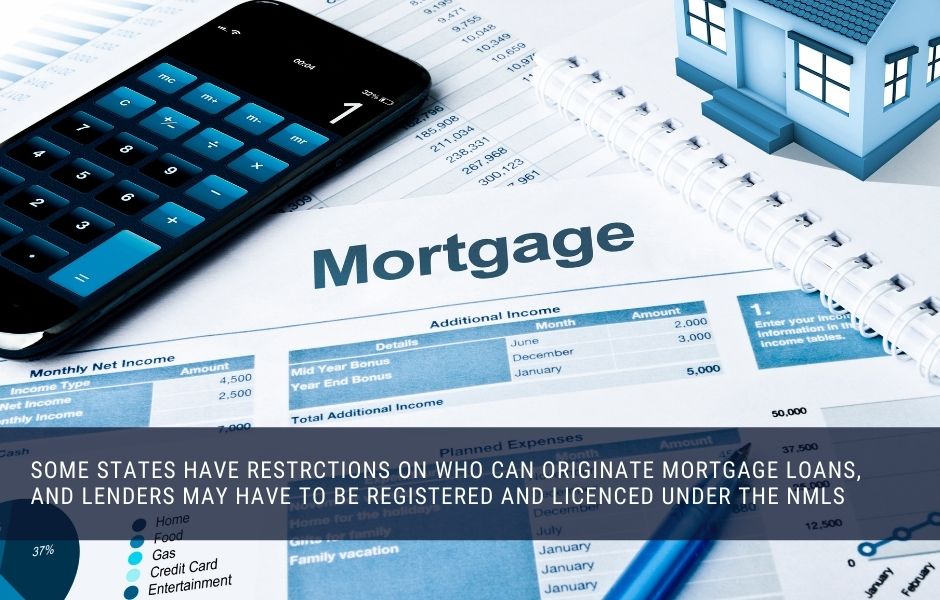
It’s a good idea to check with an attorney in the state you want to lend in about any restrictions or licensing requirements that you need to be aware of.
When it comes to licencing requirements for originating loans, it can be relevant where the loan originator or lender is based as well as where the property is located, so make sure to check out any State licencing requirement in your own area.
Related: Performing Notes vs Non Performing Notes | Which is the Best Investment?
2. Choose Your Deals (and Borrowers) Wisely
One of the very best things about private lending is that you get to select exactly who you work with, and what lending terms you’ll agree to. So, you can pick and choose the investment that meet your needs, in theory at least.
Of course, nothing is ever that easy.
Here are some hints and tips I’ve picked up through the course of over 100 private lending deals to help guide you on your way to making lending investments that meet your risk/return criteria.
Know Thyself
First things first, you need to set your own investing criteria. That will help you create a vetting process that weeds out the deals and borrowers you do not want to work with, and shortlists the ones you do.
Here are some useful questions to ask yourself:
What are your investing priorities? Monthly income? the best ROI? the safest possible deals? Answering these questions will help you shortlist appropriate deals, and set lending terms that meet your tolerance for risk.
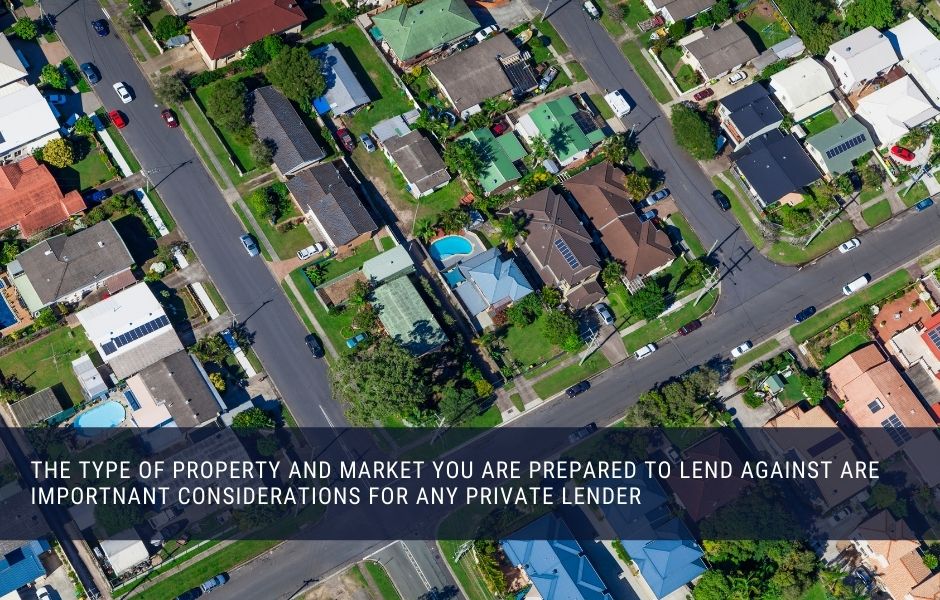
For example, if you are closer the the start line than the finish line when it comes to your investing career, you might be prepared to take bigger risks. In that case, lending on pre-rehab renovation projects with a higher loan-to-value (and interest rate) might be more up your street.
If instead you are focussed on preserving capital and generating reliable, consistent monthly income, you might be better lending only against fully renovated properties at a lower loan-to-value, in exchange for a lower rate of interest on your money.
Here are a couple of different types of private money lending deals you should consider…
Don’t Miss Out: Join 5,000+ investors and get fully-vetted lending investments delivered to your inbox every Thursday
Rehab Loans
This is the bread and butter of the private lending world.
Real estate investors often turn to private lenders for funding when a deal needs closing fast with cash.
This type of short term funding is expensive compared to bank loans, but private lenders are way more flexible on terms, and can fund deals much faster and on short notice.
Most of the time it’s a pretty happy marriage between operational capacity and passive capital. Here’s how it works…
The RE investor will find a house they want to purchase, do their due diligence, and put together a plan to renovate the property to add value and then either sell (flip) or refinance (hold as a rental).
The private lender will loan the RE investor a portion of the funds required for the acquisition, and sometimes also some or all of the funds required for the renovation.
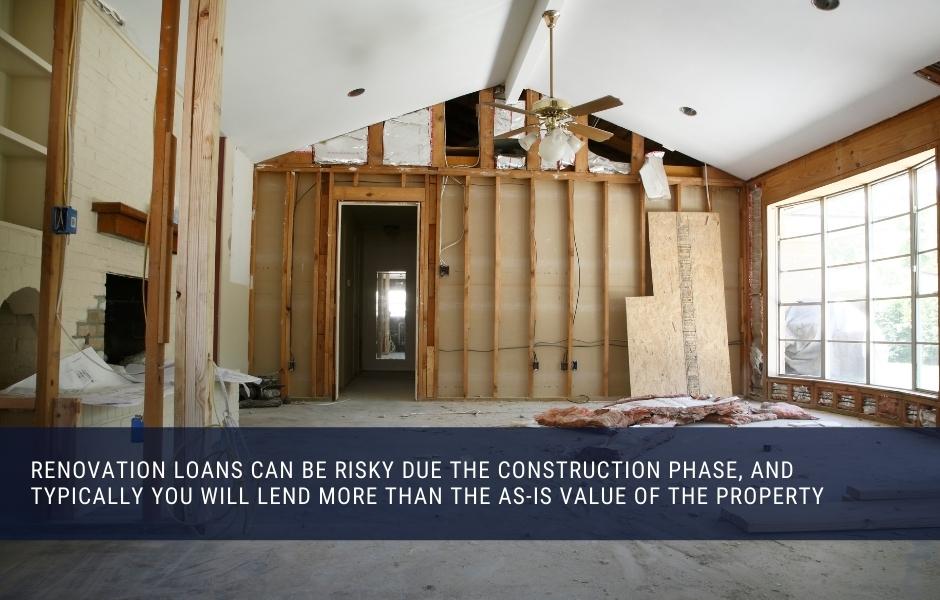
For example, a lender might offer 80% of the purchase price, and 100% of the rehab budget. The RE investor will have to come up with the extra 20% for the purchase, and also carry any overages on the rehab budget.
Once the property is renovated, the RE investor will either sell or refinance with a traditional lender in order to pay back the private lender.
In exchange for the use of funds, the private lender will charge an interest rate and sometimes points, which is effectively upfront interest paid to the private lender out of closing.
At current market rates, private lender charge interest rates ranging from 8% to 15%, and 1, 2 or 3 points, depending on the risk attached to the borrower, property plan and property.
These are the riskiest types of private money loans because there is always something that could go wrong with the project, such as large unexpected repairs, or failing to sell/refinance in time or for the expected value.
That’s why the interest rate charged by private lenders for this type of deal is so high.
Rental Loans
For the investor with less appetite for risk but still desiring a great returns on investment, there are opportunities to lend money secured against fully-renovated real estate in the form of long term rental loans, or short term bridge loans.
This type of loan eliminates or mitigates much of the risk associated with private lending because there is no construction required.
The collateral property is valued in as-is condition – often having been recently renovated, tenant-occupied and producing cashflow.
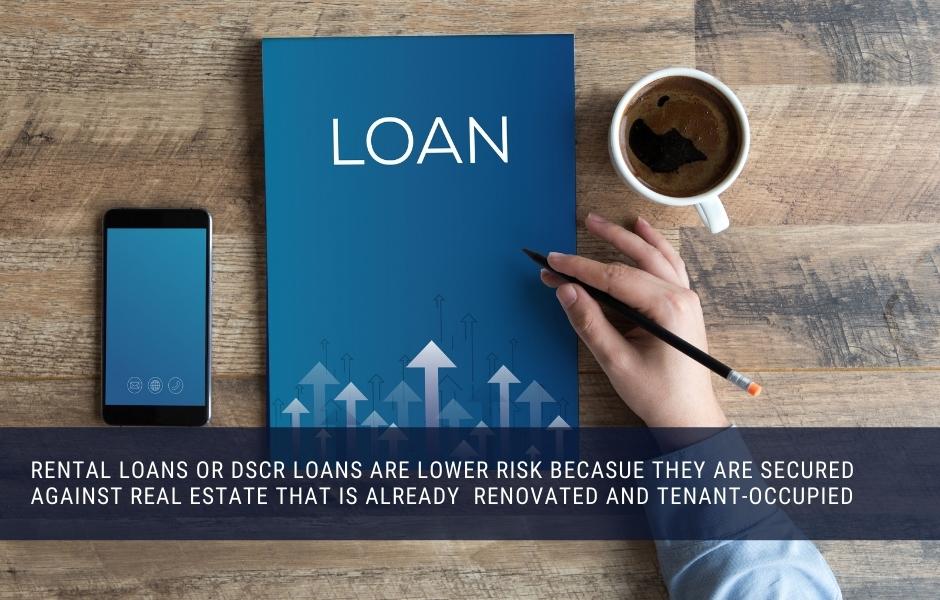
So, in these cases, the lender has a lot more certainty about what the property is worth, and what level of risk they are taking.
If the borrower defaults, they are getting a house in great conditions that is producing rental income to replace lost interest income, and it is likely to be much easier to sell to recoup the lenders investment.
Of course, this type of lending attracts a lower premium in terms of interest rate due to the significantly lower risk, but still lenders earn between 7% and 9% p.a. – still far better than 1% or 2% in a deposit account.
Related: See fully-vetted lending investment opportunities in the Private Lender Portal
It’s a People Thing
Once you’ve decided on the level of risk you’re prepared to take, and the type of lending you’re comfortable with, you really need to be comfortable with the borrower before anything else.
A goof operator with lots of relevant experience can save a bad project. Likewise, a bad operator can just as easily ruin a perfectly good project.
In private lending, you should should focus on the 4 P’s… People, Property, Paperwork and Plan.
The people are responsible for taking the cations that will lead to the success or failure of a project.
The property acts as security for your investment, and the paperwork is there to allow you to take control and have recourse if something goes wrong.
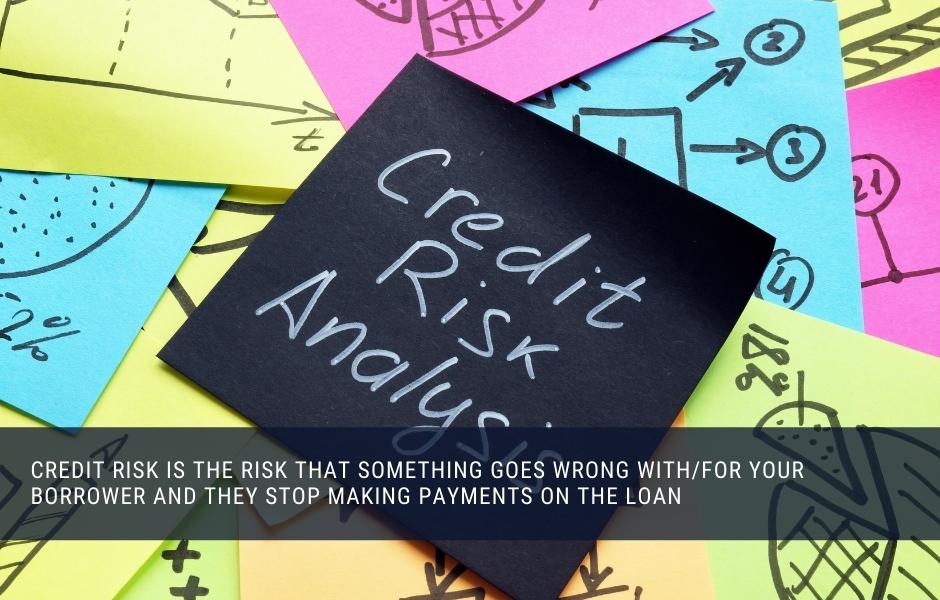
These elements of a private lending deal are all just as important as each other, but it’s the people that most most lenders put first in when making their lending decisions.
Remember, you’re entering into a business relationship with your borrower. You need to be comfortable with them, how they conduct themselves personally, their level of experience successfully completing similar projects, and how they do business.
Put the people first, and don’t be tempted by a great looking deal with stellar returns if your gut tells you it’s too good to be true. I guarantee you it probably is!
Related: Understanding Credit Risk for Note Investors and Private Lenders
3. Taxes, Title and Insurance
Recently, I had a great guest on my Investor Conversations podcast as part of our Note Investing Mastery mini series.
Tracy Z is a 30-year note investing veteran, and Co-Founder of noteinvestor.com, a leading note investing education platform.
During this episode, we talked about some of the most common mistakes made by investors that are new to mortgage note investing, and one of the biggest takeaways for me was that Tracy always takes extra care to check out taxes title and liens.
Now, while this podcast episode was about note investing, Tracy focuses her own investment efforts specifically on performing notes such as seller finance notes, there is a huge amount of crossover with private lending, and her advice holds true for both modes of investing.
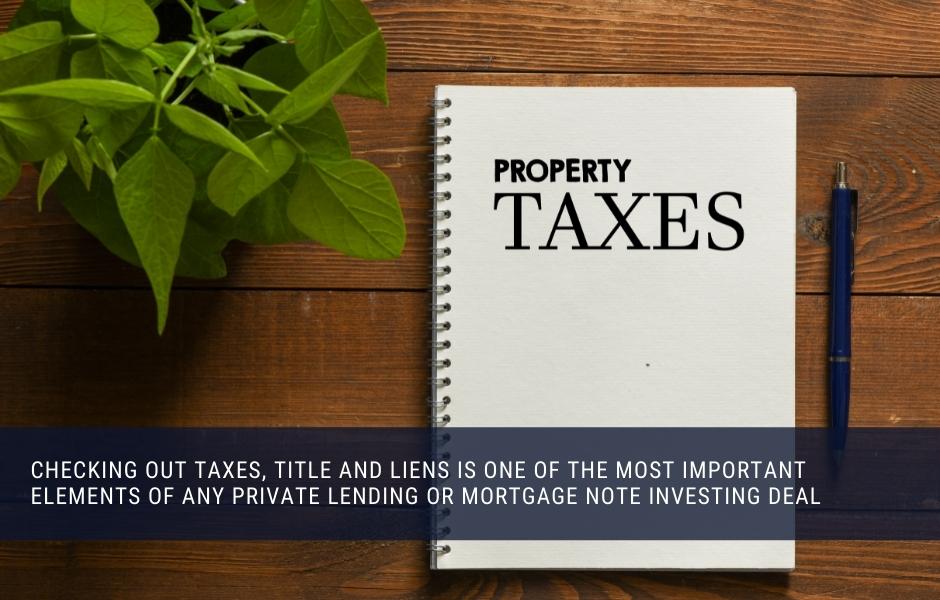
As a lender, you are relying on the property as the ultimate fallback if something goes wrong with your investment. But if there are issue with title, or liens, or unpaid property taxes, that could get in the way if the property must be sold. In some cases you might even be facing a total loss.
That’s why it’s super-important to close your loan properly through a title company or attorney, make sure they do full title work and resolve any issue before you fund the loan, and make sure you get both lenders title insurance AND that the property is insured.
As a warning, Tracy tells the story of how she closed on the purchase of a note secured against an uninsured property, only to see the property burn down the very next day!
So yes… taxes, title and liens are very, very important, but easily mitigated with proper title work, proper closing, and proper insurance.
Stay Up To Date: Join 5,000+ investors and get fully-vetted lending investments delivered to your inbox every Thursday
4. Know Your Worst Case Scenario
This was another thing we talked about in my podcast episode with Tracy Z.
In fact, this is a topic of conversation that has come up time and again on my podcast.
Private lending is no different to any any investment… you need to know your worst case scenario.
In my experience, your worst case is usually a borrower defaulting i.e. they stop making payments, or fail to pay back the loan at maturity.
Unfortunately, unless you have a great, communicative borrower (which you really do want), you won’t know there’s even a problem until this happens.
There could be a number of reasons for a default, including problems with cost or timeline of the renovation, a change in market conditions slowing or stopping a the planned sale of the property, or a failure by the borrower to secure refinancing.
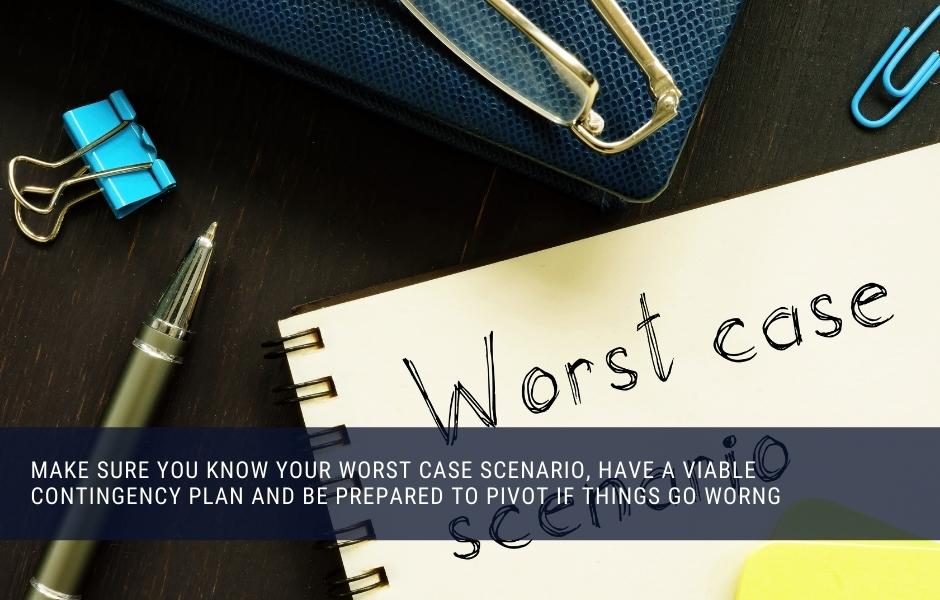
Whatever the reason, you must be prepared to pivot when the plan isn’t the plan anymore.
Will you step in and finish a rehab if it doesn’t go to plan? Will you simply foreclose and force a sale? or will you aim to negotiate taking ownership yourself?
These are all viable options in a default scenario, but not all of them will be suitable or desirable for every lender or every project.
If you are lending against a house located way across the country, it’s unlikely that you’ll want to try and finish the rehab project yourself. In that case, your worst case might be a sale in as-is condition.
That’s why knowing your worst case (and having a viable contingency) is important.
It will help you to formulate your lending terms, including how much you’ll lend, what kind of projects you’ll fund, and the type of borrower you’ll work with.
Related: Understanding and Assessing Credit Risk for Private lenders and Note Investors
5. Paperwork and Closing
Your paperwork is one of the the P’s (Payor, Property and Paperwork).
Regardless of the quality of the real estate, or the capability of the borrower, you will ultimately be relying on our paperwork to recoup your investment if things go badly wrong.
So, you absolutely need to make sure your documentation is in order to protect your investment.
You also need to make sure your paperwork is recorded properly, that you are investing against a property with clear title, and that you have all the relevant insurance in place.
That’s why is absolutely essential to close your loan through a proper title company or attorney.
The Paperwork
Your primary paperwork for any lending transaction comprises three main elements; a loan agreement, a promissory note, and a lien (deed).
Each item serves a different purpose, and they work together to define the terms of the investment and provide you with security in the form a legal charge over the real estate.
Loan Agreement
Aside from perhaps a loan application, the loan agreement (I call mine a Funding Agreement) is a an agreement between the borrower and the lender that defines the commitments, roles and responsibilities of each party.
This will contain things like the legal names and addresses of both parties, the property details, loan amount and terms, and details about what happens at closing.
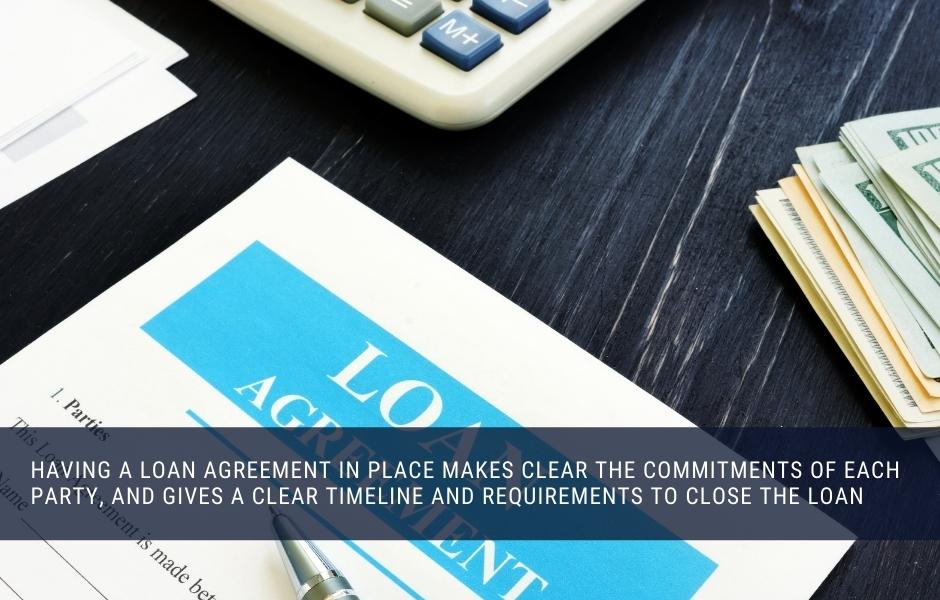
In the case of renovation loans, the loan agreement might also include details of how funds are drawn down by the borrower for each phase of construction.
Once this agreement is ion place, everyone know hat they are committed to do, and to a timeline.
Pro Tip: Have an attorney draw up your loan agreement template which you can then edit with details specific to each transaction
Promissory Note
Your promissory note is the contract between you and your borrower.
This document contains the terms of the loan, including the amount, interest rate, payment schedule, and a long list of legal jargon and clauses that define your recourse if the borrower defaults.
Notes are entirely subjective, and the terms are specific to the deal between the borrower and the lender at the time of the loan.
It is also worth noting that the language in a promissory note varies from state to state, so it is absolutely worth paying an attorney to draft or review your note before funding a loan.
Related: Real Estate Notes | Everything you Need to Know
Deed
Your deed will be either a Mortgage Deed or Deed of Trust depending on where the real estate is located.
This is the document that is recorded in the County records on the title to the the real estate, and gives you a legal charge for the amount of your loan.
Your deed ensures you are paid out of the proceeds of a sale of the real estate, such as in the case of a foreclosure sale, or even just the borrower selling the property as planned.
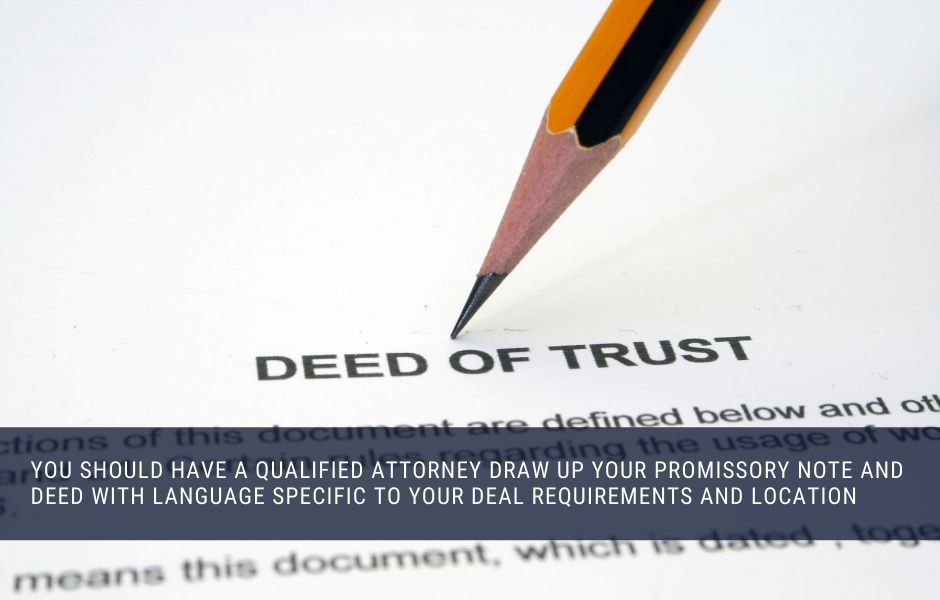
Your lien can be in either 1st position or 2nd position, and you always want to be in first position.
1st position liens are paid back first when the property is sold, whereas 2nd position liens are paid back from any remaining funds. So, if the proceeds of the property sale are insufficient, a 2nd position lender could lose everything.
Whether it’s your loan agreement, promissory note or mortgage deed/deed of trust, make sure to have your paperwork drafted or reviewed by a qualified attorney to avoid any upsets if you end up foreclosing the loan.
Related: Understanding Lien Position and Priority for Private Lenders
Close Properly
The final piece of advice I have for you is to use a proper closing company or attorney to close your loan, record your deed, and provide you with title insurance.
I’ve had to relay on title insurance in the past when selling houses that had title issues that were missed when I bought the house. If we didn’t have this insurance in place, both my private lender and I would have lost out.
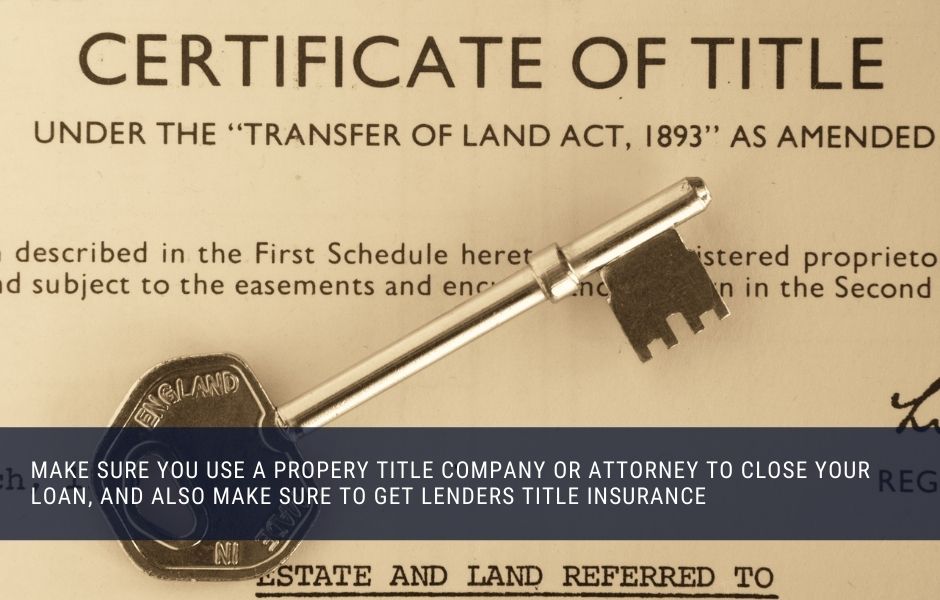
Your closing co. will also distribute funds according to the settlement statement, and you can further add conditions such as checking the property insurance is in place.
Remember the story Tracy Z told about an uninsured house burning down the day after she bought the mortgage? These thing happen, so making sure everything is in order at closing is your backstop for tragedy.
So, that conclude my top five tips for anyone considering doing any private lending in 2022.
Remember, whilst loaning your money can be very profitable, you need to educate yourself and take professional advice if you are going to lend money legally and safely.
See Exclusive Deals: Join 5,000+ investors and get fully-vetted lending investments delivered to your inbox every Thursday
Useful Links and Resources:
- Pro Title – Title and tax due diligence
- Richmond Monroe – Collateral File Review
- US Census Data – Market and demographic due diligence
- Lexis Nexis – Liens, Judgements and Credit Due Diligence
More Private Money Lending Education
- Private Money Lending Case Study July 2022 II
- Private Money Lending Case Study July 2022 I
- 5 Pro Tips for Vetting Private Money Lending Borrowers
- How to Lend Money Legally and Safely
- Where to Buy Mortgage Notes – A Complete List of Verified Sources
- Private Lending 101 | The Complete Guide to Private Money Lending
- Note Investing 101 – Everything you Need to Know About Note Investing
- How to Invest in Notes – 7 Note Investing Strategies
- What is a Note and What Terms Should It Contain?
- Performing vs Non-Performing Notes – Which is the Better Investment?
- The Private Lender’s Guide to Assessing Credit Risk
- Understanding Lien Position and Priority
- How to Buy Mortgage Notes Online in 2021
- How to Assess Real Estate for note Investing and Private Lending
- Find Performing Notes for Sale in 2021
- Private Lending 101 – Everything you Need to Know About Private Money Lending
- Is Buying Mortgage Notes a Good Investment in 2021?
- Note Investing vs Rental Properties – Which is the Best Investment?
- Performing Notes – What Why and How to Buy
- Is Real Estate Note Investing Risky?
- Real Estate Notes vs REITs – Which is the Better Investment?
- The 3 Best Real Estate Investing Opportunities in 2021
- What is the Difference Between a Note and a Mortgage?
- Real Estate Notes – Everything You Need to Know
- My Top 5 Real Estate Note Investing Tools and Resources
- 3 Note Investing Funds for Passive Investors
- Using Note Investing to Boost Your Monthly Income
- Non Performing Notes – Everything You Need to Know
- The Ultimate List of 24 Investments That pay Monthly Income
- Forbes – How to get started as a private money lender
- Wallethub – What is private lending and how does it work

